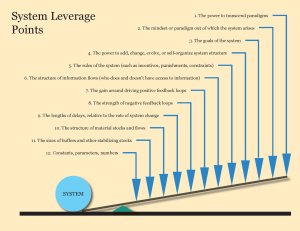Effectiveness
Effectiveness
I recently had a bit of a wake-up call via Twitter. I asked the following question:
“What’s the one thing /above all/ that makes for an effective organisation?”
My thanks to all those who took the time to reply with their viewpoint. The wake-up call for me was the variety of these responses. All over the map might be a fair description. Which, given I’ve been writing about effectiveness in the context of organisations for more than a decade now, tells me I’ve some way to go to get my perspective across. Not that I’d expect folks to respond by simply parroting my definition, of course. And nor do I claim any special authority over the term.
Goldratt defines (in)effectiveness as:
“Things that should not have been done but nevertheless were done.”
Drucker defined it as:
“Successfully aligning behaviour with intentions.”
Aside: It’s been my experience that (organisational) effectiveness gets little attention or focus in most organisations. And seeing as how in most organisations things are so ineffective, I’ve come to believe that those making the calls don’t see a need for effectiveness.
Spectra
Effectiveness is a spectrum. From highly ineffective through to highly effective. Note that this spectrum is orthogonal to the spectrum of organisational success (by whatever measure you might choose for success: revenues, profits, social impact, personal kudos, joy, employee satisfaction, customer satisfaction, quality, returns to shareholders, executive bonuses, w.h.y.).
Effective organisations are not necessarily successful, and successful organisations are not necessarily effective. I posit that effectiveness can help create, contribute to, and sustain success. I seem to be in a minority.
Survey Results
Here’s the responses I received to my question “What’s the one thing /above all/ that makes for an effective organisation?”:
- @FragileAgile: “Folks needs being intentionally met.”
- @andycleff: “+1 to Trust. Foundation for all the things.”
- @LMaccherone: “Happy paying customers”
- @stuart_snelling: “Accurate, contextual and meaningful data that is readily accessible.”
- @ChangeTroops: ”Growth mindset.”
- @allygill: “Effective people who understand the needs of their customers (internal and external) and each other.”
- @KarimHarbott: “Totally and utterly dependent on what they are trying to achieve.”
- @ArnoutOrelio: “People”. “Their ability to improve things; their creativity.”
- @gertveenhoven: “Trust.”
- @ferigan: “A team structure that doesn’t require effort to collaborate in and allows work to flow well.”
- @anam_liath: “Common vision and ideals.”
- @rogersaner: “Empowering your people.”
- @sourabhpandey05: “I would say ‘Culture’ of the organisation. Culture which promotes1 the values trust, transparency, respect for everyone.”
- @heybenji: “Ingenuity.”
- @joserra_diaz: “Mindset of the owner.”
- @ard_kramer: “Autonomy for individuals and a common understanding of what is of value for the organisation.”
- @martinahogg: “Alignment.”
- @briscloudnative: “Love.”
- @barryfarnworth: “Understanding purpose….”
- @mikeonitstuff: “Ultimately I think it’s leadership. The leaders set the stage for the culture and the vision for the organization. Poor leadership can destroy value and morale, great leadership creates the conditions for high performance.”
- @EricStephens: “Uniform Commitment to the mission.”
For each of the above, I invite you to apply this litmus test: “if we had this, would we then necessarily be effective?”
Rightshifting
Some folks asked me for my “answer”, so here it is:
Rightshifting and the Marshall Model both attribute (relative) organisational effectiveness to the prevailing collective mindset. That’s to say, what an organisation collectively believes about how the world of work should work will absolutely dictate how effective that organisation will be. Any organisation wishing to become significantly more effective faces the formidable challenge of changing its collective assumptions and beliefs about work (in the broadest sense of the term). In other works, change the prevailing paradigm, or better yet, acquire the power to transcend /any/ particular paradigm.
For clarity then, the one thing above all that makes for an effective organisation is its collective mindset a.k.a. memeplex.
This echoes the famous “Twelve Leverage Points to Intervene in a System” by Donella Meadows:
– Bob


Pingback: Five Blogs – 24 October 2018 – 5blogs
Pingback: Effective Organizations — Think Different – Investigations of a Dog